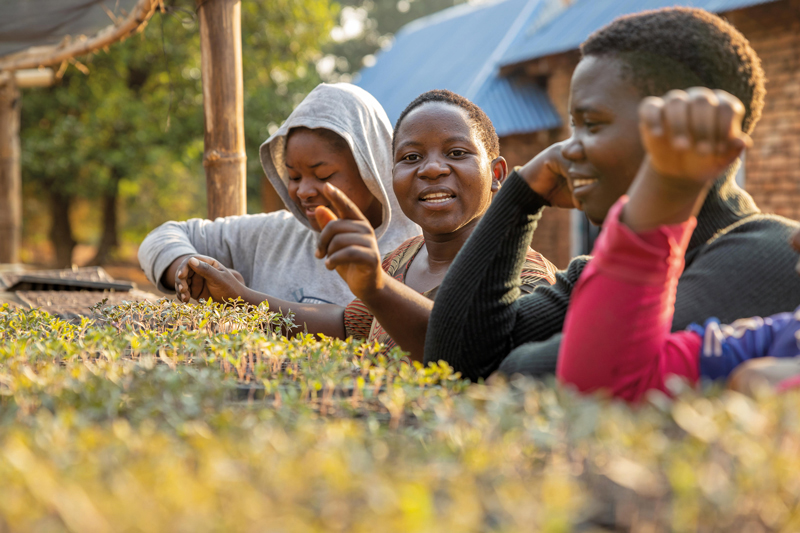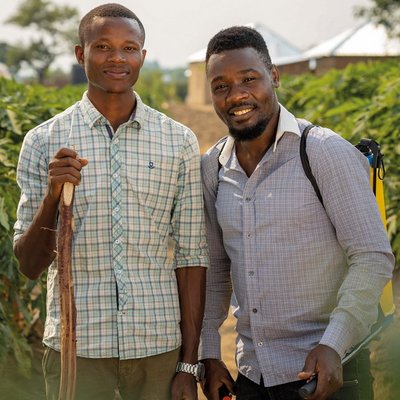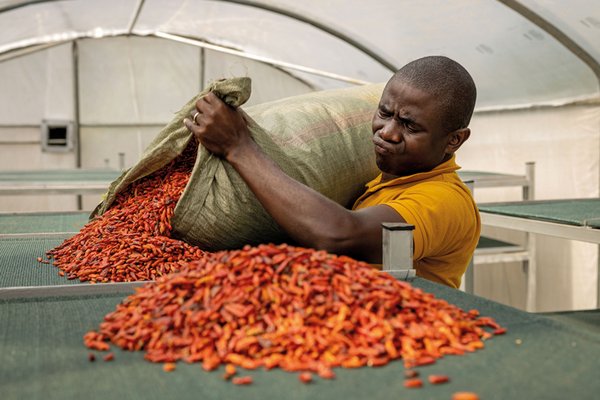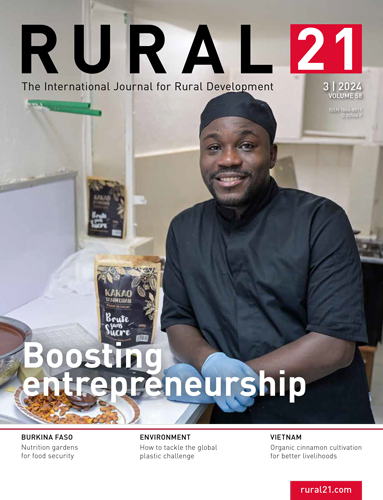 Download this article in magazine layout
Download this article in magazine layout
- Share this article
- Subscribe to our newsletter
Empowering women and youth in horticulture with the help of local service providers
Tanzania’s main economic activity is agriculture. It employs around 65 per cent of the country’s labour force, accounting for roughly 27 per cent of the Gross Domestic Product (GDP) and 30 per cent of export revenues. With an annual growth rate of 8 to 10 per cent, the horticulture sector is the fastest-growing agricultural sub-sector. Having the potential to increase national income and farmer earnings by servicing both local and export markets, it has been identified as a sector to be supported by the National Agriculture Policy (2013). The Tanzania Agricultural Sector Development Program Phase II (2016/17–2025/26) has prioritised the promotion of the horticultural sector in the Southern Highlands for household nutrition, market supply and diversification.
Leveraging the potential of the horticultural sector
Despite a growing demand for high-quality food driven by the expanding middle class, smallholder farmers find themselves facing obstacles, ranging from a lack of knowledge and high operational costs to inadequate access to technology. Simultaneously, urbanisation and economic growth have fuelled an increased appetite for quality food among the middle class, increasing the demand-side pressures. However, this surge in demand has come at the expense of smallholder farmers, who continue to face systemic barriers that block their ability to thrive in the horticultural sector. This also applies to the Southern Highlands. Underlying reasons for the underperformance of the horticultural sector in this agroecological zone include farmers, especially women and young horticulture farmers, having neither access to training and information nor skills and knowledge of good horticulture practices, nutritious and safe food, and quality value addition.
These constraints are compounded by weak financial literacy, limited access to finance and poor uptake of innovative ideas. In addition to a lack of knowhow regarding cultivation, the low quality of the horticultural products is put down to dysfunctional linkages among different actors along the horticulture value chains. Actors often lack the skills required to assess the market for their products and services, establish long-term relations with other actors and develop their business through additional investments. Moreover, dialogue and lobbying with the government is at a low level.
It is against this background that the European Union-funded initiative “Empowering Women and Youth Farmers on Horticultural Production and Marketing” (Kibowavi) was implemented in eleven district councils across the regions of Mbeya, Songwe and Katavi in the Southern Highlands of Tanzania from February 2020 to February 2024. The Initiative was spearheaded by Helvetas Swiss Intercooperation in collaboration with several local NGOs.
About Kibowavi
Helvetas Swiss Intercooperation implemented Kibowavi in collaboration with the local NGOs Actions for Development Programs – Mbozi (ADP-Mbozi), Community Development and Relief in Tanzania (Codert) and the Tanzania Food Processors Association (Tafopa). The project’s overarching goal was to enhance food and nutrition security in the Southern Highlands, stimulate private sector expansion, promote job opportunities within the horticultural sector and foster inclusive economic growth. In enhancing specific small-scale horticultural value chains, the project aimed to improve the overall framework conditions to enable greater integration of women and young smallholder farmers into the horticulture sector. At the end of the project, early in 2024, the capacity of 100 LSPs was built, and at least 60 per cent of trained LSPs continue to provide agriculture and business services to farmers in a sustainable manner. Forty per cent of the LSPs are women. The LSPs currently provide employment and income to another 632 young women and men who work for them as employees or agents. In addition, LSPs offer services at the doorstep of over 20,000 smallholder farmers along various value chains.
Facilitating the local service provision model
One crucial element of the project was the training and assignment of local service providers (LSPs). Acting as a hinge between smallholder farmers, private sector entities and Government line agencies, LSPs are entrepreneurs who support smallholder farmers in entering and establishing themselves in the respective sector. The project focused primarily on youths coming from the region or community. It built capacity of these LSPs and supported them in coming up with a value proposition and business model for local service provision to farmers.
The LSPs were trained by the project and other contracted national institutions that specialise in a certain field to provide advice, coaching, training and services. Training comprised the establishment of Village Savings and Loan Associations (VSLA) to improve access to financial services, good horticultural practices to increase access to healthy food and consumer markets, and nutrition-sensitive practices focusing on home consumption and a balanced diet for children. It also included climate-smart agriculture measures such as the use of organic farming practices, including the formulation of organic pesticides and bio-fertilisers, as well as linking farmers with different value chain actors.
Initial training was funded by the project, with training and coaching for further specialisation partly depending on what the market needs were. Selection of candidates took place through networking. Here, recommendations by local authorities and sector stakeholders were made use of, and potential horticulture actors were identified. Depending on a set of criteria regarding competences, interest and motivation – such as drive to establish themselves as service providers – as well as the needs for services in the sub-sector, further selection was made. Based on such criteria, the future LSPs were also supported in further developing themselves. When a selected person proved not entrepreneurial or lacked initiative, no further investment was made.

Diversification and better market access give women and young farmers more choices.
Photos: Franz Thiel/ Helvetas Tanzania
In the first year of the project, we wanted to know whether committed LSPs would also work with Kibowavi even without any remuneration. In the second and third year, in order to strengthen LSP-farmer relations, travel costs to farmer groups were covered. Here, LSPs were paid little allowances upon delivery of advisory, input/processing and marketing services, which were appraised by the farmer groups themselves, via a voucher system. The aim was to ensure that they reach the groups and create demand for services to enhance the LSPs’ business cases. In the fourth year, we did not pay allowances because LSPs already knew the importance of interactions with the groups/farmers whom they realised as their potential clients for their business cases, which continue to date even after the project phase-out.
Farmers fund the services through their VSLA activities. The VSLA as a first entry point proved to be a good start to try out an LSP as a group, thus minimising the risk for individuals and reaching out to more persons. As soon as an LSP showed that it could provide useful services, these were bought either by the respective group or by a new group formed by an LSP, or by individuals from or outside a group. Mostly, advice is embedded in other services, for example a commission on inputs provided (such as fertilisers, pesticides, seeds and seedlings), or the LSP aggregates produce to sell to a higher market and is paid for this.
The farmers are highly satisfied with the availability and quality of the services. With the support of LSPs, they improve practices, reduce post-harvest losses, etc., and find better markets, which is expressed by an overall increase in their earnings. The combination of free-of-charge, embedded and fee forms of the service makes it affordable for the farmers. One example here is a strawberry LSP who provides seedlings (paid), trains women groups in growing strawberries (without being paid), but pays for the harvest, further processes the strawberries or packs them for selling in the city.
Capacity-building, empowerment and job creation
The LSP model has elevated the skills and knowledge of women and youth smallholder farmers in the region, empowering them to generate assets and enhance their economic outlook and self-confidence. They have adopted good horticultural practices in the production of existing cultures, such as avocado and tomato. In addition, new products like strawberry and vanilla were introduced. Moreover, the farmers have found new markets for their produce, so that they can now sell to different kinds of buyers, such as small, medium and large ones, both locally and internationally, which also gives women and young farmers more choices. This was enabled by LSPs working together with both public and private actors.
Moreover, in the LSP model, the local service providers themselves contribute to private sector development. They create new opportunities and jobs, since, soon after “launching” their business, many LSPs look for additional staff. In the example described here, employment opportunities for 1,053 youth and women have been created who are working through the supported innovative technologies, e.g. processing facilities, markets, driers, etc., which are managed by the LSPs and/or small and medium enterprises, including processors. The initial investment by the project led to individual LSPs investing in different business cases, including hiring staff, buying equipment, selling agricultural inputs (fertilisers, pesticides, greenhouses and drip kits installation, seeds and seedlings), value addition (processing and selling of horticultural products) and linking to agents. Private companies were offering commission or other support to LSPs in order to increase their own outreach (given that LSPs are part of or close to farming communities). The public sector invited LSPs to events, to share experiences, etc.
From LSP volunteers to successful entrepreneurs
Elisha Selemani and Innocent Makula are two young people in their twenties who have chosen to become entrepreneurs. “Our journey began as local service provider volunteers under the Kibowavi initiative,” Elisha explains. “With the training in poultry and rabbit rearing from the Tanzania Agricultural Research Institute, we were able to start our farm with 20 chickens and six rabbits.”
As the number of their chickens grew, the two entrepreneurs requested Kibowavi co-funding to invest in a feed-making unit and a chick-hatching incubator. The demand for rabbit meat and rabbit urine for organic farming and bio-pesticides is steadily increasing. Other farmers are also adopting production of this bio-pesticide. “Our company is expanding; we can currently hatch up to 1,200 eggs in three weeks, and we are planning to start commercial chicken feed production with the projection of generating an income of 43 million Tanzanian shillings per year,” Innocent explains. In addition to their own farming activity and offering extension services to poultry and rabbit farmers, the two young men are now expanding their farming with the cultivation of passion fruit and papaya.
Elisha Selemani (l.) and Innocent Makula.
Good prospects, while challenges remain
Thus far, the LSP model has delivered on its promises, fulfilling economic, social, and environmental objectives, including the promotion of organic farming and adherence to good horticulture practices. While not all tangible (land, housing) and intangible (nutritional security, education, confidence, empowerment) assets can be solely credited to the LSP model, the services have undeniably played an important role in diversifying livelihood strategies and fostering income-generating activities among smallholder women and young farmers. Thanks to the LSP model, farmers and other stakeholders interact dynamically. They know where to get support, and the farming communities benefit from long-term access to private extension services.
In the three project regions, service providers have become agents of change: to farmers as a reliable source of knowledge and voice, to local extension offices as complementary service providers and to other market actors as critical entry points for business expansion. Smallholder women and young farmers in the sector now have different options for services – the LSP model, private sector service from other consulting firms or businesses, and formal extension services. The LSP model has the advantage of being much closer to the farmers and easier to access – the LSPs live among the smallholder farmers, which guarantees accessibility. As they are often farmers as well, they understand the needs and priorities of smallholder farmers, which enhances the model’s social sustainability. In contrast, the outreach of public extension services is very low and larger companies/consultants are also difficult to access for a smallholder. LSPs fill a gap here too, linking companies to smallholders.
Nevertheless, there are challenges in terms of enhancing the efficiency and quality of knowledge (e.g. reskilling, upskilling). With the increasing complexity the agricultural sector is facing, such as climate change, price fluctuations or the adoption of innovations such as digitalisation, the need for nurturing a “collective knowledge space” becomes critical. As more LSPs engage with major private sector input providers, maintaining service quality gets increasingly challenging as many clients and wide coverage can overload the LSPs. Quality assurance mechanisms and information dissemination become complex, and inefficient informal channels are often resorted to for knowledge exchange.
The LSPs have recently formed the Tanzania Local Service Providers Association (TLSPA) for easy coordination, knowledge exchange and pulling together of resources, but also in building capacity of new LSPs. The establishment of the TLSPA can help in expanding the model to other parts of the country as well as in providing services to other associations. It is also an important juncture in the model’s standardisation and consolidation. Currently, the TLSPA has 54 members from different regions (Mbeya, Songwe, Katavi, Singida, Morogoro) and is slowly growing.
One weakness is that only few LSPs were able to coach the farmers in business plan development and usage, because it is a detailed tool which requires some knowledge of finance. Hence the farmers are unable to mobilise financial resources (e.g. working with banks), which means that economic sustainability is not guaranteed. Here too, TLSPA is active, coaching a few LSPs and SMEs on business plan development.
Helvetas Tanzania introduced the LSP model in the region in 2020, based on their good experience gathered in Bangladesh since 2006. It was a bit of a risk to see whether it would work in a very different context where farmers used to expect all improvements to come from the government. But it seems that times are changing, and that the present generations are much more entrepreneurial; one other favourable aspect was the creation of access to information and technology for smallholders.
Zenebe Uraguchi is a Professor of Development Economics with Bern University of Applied Sciences, Switzerland.
Daniel Kalimbiya is Project Director for Helvetas Swiss Intercooperation, and is based in Morogoro, Tanzania.
Annet Witteveen is Country Director Tanzania for Helvetas Swiss Intercooperation, and is based in Dodoma, Tanzania.
Contact: daniel.kalimbiya@helvetas.org




Add a comment
Be the First to Comment